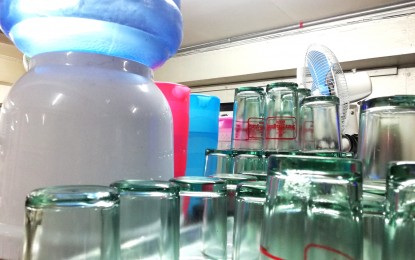
BOIL WATER. Baguio City health authorities are urging the public to boil water for drinking for at least three minutes to make this safe for consumption. A gastroenteritis outbreak was declared in the city on January 10, 2024 after cases rose to more than 1,600 that day. Ten of the 147 water samples gathered after the outbreak declaration were found to be positive for E.coli (Escherichia coli) bacteria. (PNA photo by Liza T. Agoot)
BAGUIO CITY – The local health chief here has urged the public to boil drinking water for drinking and use treated water for cooking after 10 of the 147 tested water samples were found positive for E. coli (Escherichia coil) bacteria.
"We would like to reiterate, boil your drinking water. It is the safest purification,” Dr. Celia Flor Brillantes, acting chief of the City Health Services Office (CHSO), said in a late afternoon press conference on Sunday, days after a gastroenteritis outbreak was declared in the city last week.
She said people should let the water boil for at least three minutes to ensure that all impurities will be removed or killed.
A gastroenteritis outbreak was declared over Baguio City last January 10 after cases rose to more than 1,600 as of 3 p.m. Wednesday last week.
As of Sunday, more than 3,000 individuals have been recorded to have suffered from the illness based on a self-reporting app of the local government.
Citing the latest data, Brillantes said at least nine percent of the victims are tourists who came to the city during the holidays, at least 10 percent are residents of neighboring towns -- La Trinidad, Itogon, Sablan, Tuba and Tublay, while the bulk are city residents.
She added that of the 64 water samples tested by the CHSO 10 showed positive presence of fecal matter.
E.coli are bacteria found in the environment, foods, and intestines of people and animals.
She said the Baguio Water District also conducted water testing on at least 83 samples obtained from distribution lines, but all tested negative.
She said stool samples tested after the outbreak were found to be positive for Norovirus and Sapovirus, viruses that affect the stomach and intestines and are easily transmitted.
Also, Dr. Ian Christian Gonzales of the Department of Health-Epidemiology Bureau, during the same press conference, said aside from providing technical assistance, health authorities are focusing the investigation on cases treated at the medical facilities.
"Stool samples from the hospitals were brought to the RITM (Research Institute for Tropical Medicine) for bacteriology," he said, noting that results are expected to be released by Wednesday.
Continuing tests
Brillantes said they continue to test the areas where water samples were found to be positive for fecal matter until tests show that these are fully cleared.
She said food establishments will also be allowed to operate once they are declared completely free of the contaminants.
She said cases have decreased, with only three received cases on Sunday compared to hundreds a day in the last few days.
The biggest number of reported cases was registered last Jan. 8, with 520 cases.
She also said that all water delivery providers, whether for drinking or other uses, are also being tested.
"We assure the public that we are getting to the root of the problem," she added. (PNA)
